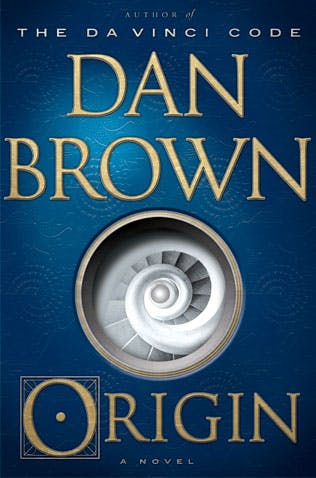“‘This getaway car was hired,’ Langdon said, pointing to the stylized U on the windshield. ‘It’s an Uber.’” Such a virtuoso act of interpretation could only be the work of Robert Langdon, Harvard professor of “symbology” and the hero of Dan Brown’s novels Angels and Demons, The Da Vinci Code, The Lost Symbol, Inferno, and now Origin. This new novel features many of Brown’s signature themes. An evil, Catholic-adjacent cult, in this case the Palmarian Church, is behind some murders. Gems from art history are the key to solving the mystery. And a predictably hot woman, in this case the future Queen of Spain, trots along at Langdon’s side.

The Uber detail is one of many marking Origin as a techno-thriller in the tradition of Brown’s standalone book Digital Fortress (1998), though it shares much with Brown’s best-known novel about Da Vinci and the Holy Grail. In this new book, a techie genius named Edmond Kirsch (I looked for a secret anagram but found only Dim Shock Nerd) is killed on the brink of revealing a huge scientific breakthrough, one which he promises will change religious views of Creation forever. Teaming up with Kirsch’s A.I. creation “Winston,” Langdon must run around Barcelona to recover Kirsch’s presentation so that the world can share in his discoveries.
The faithful will be glad to hear that there’s a Da Vinci Code-esque background to Robert Langdon’s mission. The woman hosting Kirsch’s presentation at the Bilbao Guggenheim, where he was shot, was Ambra Vidal. This gorgeous woman in a white dress is both the director of the Guggenheim and the fiancé of Julian, the Prince and future King of Spain. Can Julian be trusted? The background conspiracy web to Origin is a bizarre fantasy in which the clergy and royal family of Spain are shadowy entities holding huge power. They may, Brown writes, be so afraid of science’s undermining Catholic orthodoxy that they are capable of nefarious deeds.
Brown has a PR person for the royal family portray the king as a “beloved symbol who held no real power.” But “it was a tough sell,” Brown writes, “when the sovereign was commander in chief of the armed forces as well as head of state.” But this isn’t true. In Spain as in the United Kingdom and Denmark, the monarchy is a faintly symbolic collection of patrons of nonprofits, retained largely for tourism reasons and because it would be expensive and pointless to dismantle them.
In this and a few other things Brown is surreally wrong. As he begins his mission to recover Kirsch’s scientific discovery, Langdon does something very odd. He lifts Kirsch’s hand and brings it to his cellphone: “Langdon carefully pressed Edmond’s index finger to the fingerprint recognition device. The phone clicked and unlocked.” It’s only a small detail, but dead fingers can’t unlock iPhones—the device requires an electrical charge from living skin.
Does it matter that Brown makes mistakes? Probably not, if the reader is in it for the thrill and the twist, which most are. And there are other things to love about Dan Brown’s prose. Origin irritates when it talks about science’s war with religion in terms you’d expect from an eighth grader, attributing wars to the difference in creation myths rather than, you know, politics. But when Brown gets corny, he does it with an earnestness that borders on the joyfully surreal. Origin is peppered with little technological details which foreshadow the novel’s final twist. We see an assassin commissioned via the “dark web.” He kills with a 3-D printed gun, then takes the aforementioned Uber away from the scene of the crime.
For Brown and for most of his readers, I’d guess, the new world of technology emits the same aura of mystery and darkness as the Catholic Church. In the Robert Langdon novels, Brown uses the church as a repository for mysteries and untold, frightening powers. He can solve its mysteries, however, because he and his “eidetic” memory understand arcane symbols from every ancient culture. The internet is also a place of codes. When Langdon deciphers the Uber logo, he at first interpreted it as a symbol for alchemy. It turned out to be two stickers on top of each other, one supporting the pope and the other indicating that the car was for hire via an app. In this literal layering of codes, Brown positions technology as religion’s new mirror—a twin source of arcane mystery.
Origin has been well-reviewed in places. In the UK Observer, Peter Conrad wondered if Brown “might be a prophet.” In the Hindustan Times, Prerna Madan called it “magnetic.” But the techno-dystopian core of Origin’s plot, which focuses on the biological origins of mankind and its evolutionary future, is a little thin, not really credible. It reads like a book by a slightly tired writer. Origin runs on about three-quarters of a plot, taping over big empty spaces with jolly filler about what the familiar heroes have been up to lately. Pitch-imperfect details about technology are liberally sprinkled over these concoctions, tied up in a bow, and shipped out to the bestseller lists. The result is a strange alchemy of imagined past, misunderstood present, and weirdly conjectured future. It isn’t a world I recognize.
